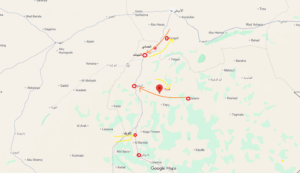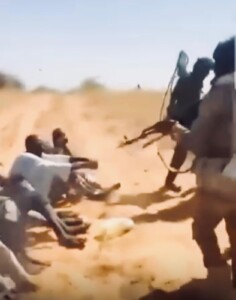Central Darfur university closed, students evicted from dorms
The situation in Zalingei, capital of Central Darfur, has reportedly returned to normal after the violent incidents on Tuesday which led to the killing of one student and the injury of many others. Zalingei University has been closed until further notice. A number of students evicted from dormitories in the town, are now living in the open.
 The entrance of the University of Zalingei, capital of Central Darfur (Social media)
The entrance of the University of Zalingei, capital of Central Darfur (Social media)
The situation in Zalingei, capital of Central Darfur, has reportedly returned to normal after the violent incidents on Tuesday which led to the killing of one student and the injury of many others. Zalingei University has been closed until further notice. A number of students evicted from dormitories in the town, are now living in the open.
According to Adeeb Abdelrahman, Governor of Central Darfur, the state government's decisions to impose a State of Emergency, secure government facilities, and suspend studies for an indefinite period have stabilised the situation.
“People returned to their jobs, and the shops and markets are open again,” he told Radio Dabanga in an interview yesterday.
On Tuesday, a student was killed and several others were wounded when security forces used live ammunition to disperse a demonstration in front of the former UNAMID team site in the Central Darfur capital. Angry students then took to the state government secretariat and vandalized the offices.
The governor corrected earlier reports about the number of fatalities. “Only one student was killed,” he said. Immediately after the incidents, the director of the university stated that a second student was killed.
Regarding the injured, three of them were discharged from Zalingei Hospital after cleaning their wounds, while a fourth was transferred to Nyala Hospital.
Abdelrahman condemned the use of live ammunition against protestors. “The regular forces are supposed to only shoot in cases of self-defence, like all other forces in the world. “They have to control themselves during demonstrations. Awareness raising and education should be developed on this point,” he said. “On the other hand, demonstrators need to learn their limits as well. They are never allowed to attack and torch buildings.”
No accommodation
The governor welcomed the temporary closure of the University of Zalingei, as this “restored the security and stabilised civil services”.
He denied that the Central Darfur government is responsible for the eviction from the boarding houses in the town, explaining that “the decision was technical and left to the competent authorities”.
'Many of us come from distant areas and cannot afford to go home because of the high transportation tariffs' – Zalingei University students
Following the decision to suspend studies for an indefinite period. administration of Zalingei University and the Student Welfare Fund responsible for housing students, gave the students 48 hours on Wednesday to vacate the dormitories.
Students from Zalingei University told Radio Dabanga that a large number of them went with their bags to the town market looking for shelter on Wednesday.
“The decision to close the dorms did not take into account that many of us come from distant areas and cannot afford to go home because of the high transportation tariffs,” one of them explained.
In Khartoum, members of various Resistance Committees organised a demonstration in downtown Khartoum, from Jackson Square to the Council of Ministers, in protest against the violence used against the students in Zalingei.
Investigation required
The Public Prosecution in Khartoum has formed a committee to investigate the violent events in Zalingei on Tuesday.
Acting Attorney General Mubarak Mahmoud granted the committee, chaired by Public Prosecutor, Suleiman Omda, the powers of the Public Prosecution to investigate and issue arrest warrants.
The head of the UN Integrated Assistance Mission in Sudan (UNITAMS), Volker Perthes also demanded an urgent inquiry into the violence. In a statement yesterday, he expressed his grave concern about the excessive use of force by the security forces. Live ammunition should never be used to control crowds, he said.











 and then
and then